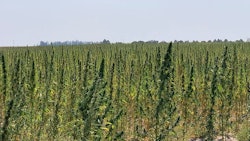With election season rapidly approaching, tetrahydrocannabinol (THC)-dominant cannabis legalization and policy reform have been hot topics among the industry. But those involved with its lower-THC-containing cousin may be wondering: Where do political candidates stand on hemp?
The National Industrial Hemp Council (NIHC) and Vote Hemp are teaming up to dig deeper into current political candidates’ stances and policy positions on hemp. The organizations will be pressing candidates on some of the industry’s largest issues, from the U.S. Food and Drug Administration’s (FDA’s) lack of regulations for cannabidiol (CBD) to the U.S. Drug Enforcement Administration’s (DEA’s) involvement in the industry.
“Hemp farming is just getting off the ground in the U.S., but the crop has huge potential for job creation and economic development,” said Eric Steenstra, president of Vote Hemp, in a news release from the organizations. “It is critical that members of Congress understand the potential of hemp and support the industry as it grows into a commodity providing nutritious foods, durable fiber and healthy supplements.”
The organizations will be reaching out to the major party candidates in races across the country, from congressional to presidential. The candidates will receive the following questions, according to the news release:
Do you support revising the definition of hemp to allow up to 1% THC while keeping a maximum of 0.3% THC in finished products so that farmers will not lose their crops?
Do you believe that FDA’s failure to regulate hemp is hurting consumers and hindering industry innovation?
Do you support the congressional intent that removed hemp as a controlled substance, or do you believe the DEA should have a role in regulating hemp production?
Both President Donald Trump and Democratic Party presidential candidate Joe Biden will be receiving the questions. In addition, candidates for Senate in the following races have been sent the questionnaire: Alabama, Arizona, Colorado, Georgia, Maine, North Carolina, and Montana.
The groups will also send the questionnaire to candidates running in the 12 House races that are considered battleground, six of which have Republican incumbents and six that have Democratic incumbents. Those are: AZ-06, CA-21, IA-01, MO-02, NJ-01, NY-22, OH-11, PA-01, SC-01, TX-21, UT-01, and VA-07.
The groups will be tracking candidate responses and posting them on their social media platforms as well as NIHC’s website.
“Hemp is a rapidly growing and ever changing industry,” said Patrick Atagi, board chairman of the NIHC. “Farmers who grow and the millions of Americans who use our products deserve to hear from candidates their policy positions on keeping hemp safe and accessible.
























